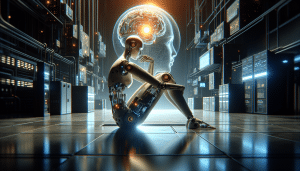You May Be Surprised by How Quantum Computing Impacts Life
Aiden Foster November 9, 2025
Explore how the mysterious world of quantum computing could shape everything from healthcare and cybersecurity to climate research. Learn more about its principles, challenges, and potential everyday applications—all explained in clear, human-centered language.
What Makes Quantum Computing Different
Quantum computing represents a leap beyond traditional computers. Instead of relying solely on bits—those familiar zeros and ones—quantum computers use quantum bits, or qubits. These are strange because they can exist in multiple states at once, thanks to a property called superposition. This means, in theory, quantum devices can process vast amounts of information exponentially faster than a classic computer ever could. It’s not just a small upgrade. It’s a radical transformation in processing power and problem-solving ability. The principles behind this, such as entanglement and quantum tunneling, offer exciting potential for tackling problems once considered impossible to solve. For instance, quantum computers may soon model complex molecules or simulate physics in ways today’s machines simply cannot.
This fundamental shift has scientists and engineers across multiple fields buzzing with anticipation. Tech industry giants and research institutions are investing heavily in quantum research, hoping to unlock breakthroughs in areas ranging from artificial intelligence to new materials development. In simple terms, quantum computers treat data with flexibility, opening the door to powerful new algorithms. Superposition enables them to explore different solutions at the same time rather than step by step, translating to a computational edge in specific domains like optimization and cryptography.
Understanding quantum computing means appreciating both the opportunities and the limits. Despite significant advancements, these systems are incredibly sensitive to noise and require special environments for operation. As a result, most quantum computers are still found in specialist labs. However, researchers are making progress in making them more stable and accessible (Source: https://quantum.gov/). The curiosity around these machines is well-founded—their potential is still just unfolding.
Quantum Computing in Medicine and Healthcare
Imagine making drug discovery faster, cheaper, and more precise. That promise drives much of the excitement around quantum computing’s impact on healthcare. Today, simulating the behavior of molecules at the atomic level remains challenging for even the largest supercomputers. Quantum devices, because of their ability to juggle enormous variables at once, may one day model these behaviors and identify drug candidates far earlier in the discovery process. By simulating these molecules more efficiently, the drug development timeline could dramatically shorten and bring life-saving treatments to patients faster (Source: https://science.nasa.gov/technology/technology-highlights/quantum-computing-for-space-exploration).
Beyond drug discovery, quantum computing could transform medical imaging and diagnostics. The technology’s ability to recognize subtle patterns in vast data sets might one day improve the accuracy of scans, perhaps detecting signs of disease earlier than ever possible before. Currently, processing imaging data—like those from MRIs or CT scans—takes significant time and resources. Quantum-enhanced algorithms could speed up this analysis, unlocking valuable insights for radiologists and clinicians across the world.
Some researchers are even hopeful quantum computers will help personalize treatment plans based on a patient’s unique genetic makeup. By unraveling the complexity of DNA, proteins, and molecular interactions, more targeted therapies could become possible (Source: https://www.fda.gov/news-events/science-science-and-research-fda/drug-discovery-and-development). While not a magic fix, this technology holds out the promise of a new era in precision, efficiency, and accessibility in health-related fields.
How Quantum Computing Could Reinvent Cybersecurity
Cybersecurity as we know it faces a dramatic shift with the arrival of practical quantum computing. The mathematical backbone of most internet encryption—algorithms like RSA—depends on the fact that some calculations take traditional computers an impractically long time to solve. Quantum algorithms, most notably Shor’s algorithm, have the theoretical power to crack these ciphers far more quickly. This prospect alarms cybersecurity experts and has already spurred a global movement toward developing new, quantum-resistant encryption standards.
Yet, it’s not all risk and no reward. Experts believe quantum computing could also fortify data protection. The principles of quantum key distribution harness the quirks of quantum mechanics, such as the observer effect, to allow two parties to share encryption keys with theoretical immunity from eavesdroppers. If someone tries to intercept the message, the process itself reveals the intrusion—making it much harder for hackers to go undetected. This could redefine what secure communication means online (Source: https://www.nist.gov/programs-projects/quantum-resistant-cryptography).
The road ahead involves complex decisions. Transitioning to quantum-safe encryption across government, business, and consumer products won’t happen overnight. However, early adopters are learning what’s required for a post-quantum world. Organizations like the National Institute of Standards and Technology are leading efforts to create quantum-resistant algorithms, ensuring privacy and integrity remain strong as computational power evolves. Individuals and organizations alike have much to gain by staying informed about these emerging cybersecurity changes.
Climate Research and Quantum Computing: A Vital Connection
Climate science is another frontier where quantum computing’s influence is being felt. Accurately modeling Earth’s climate systems—capturing variables like ocean currents, atmospheric chemistry, and human impact—creates massive computational challenges. Traditional supercomputers already do this work, but growing demands push hardware to its limits. Quantum computing’s unique strengths in handling complexity and uncertainty offer hope for even more refined models and predictions (Source: https://climate.nasa.gov/solutions/adaptation-mitigation/).
By making it possible to simulate environmental processes on a granular scale, scientists can explore scenarios and prepare for a wider range of outcomes. For instance, quantum-enhanced weather forecasting could improve responses to natural disasters, resource management, and efforts to curb greenhouse emissions. These improvements depend on advancing both the technology itself and the algorithms used in climate science.
Collaboration among governments, universities, and private industry has never been more important. Many leading quantum research projects explicitly focus on environmental applications. Their hope is that better predictions lead to practical policies and sustainable solutions. In this way, quantum computers may provide a powerful ally in the complex fight against climate change.
Everyday Impacts: How Quantum Computing Could Enter Your Life
Quantum computing may sound distant and abstract, but its ripple effects will touch daily living in many subtle ways. For example, advances in optimization could mean smoother traffic flows, faster logistics, or smarter energy grids. Imagine commutes and deliveries that adjust themselves to reduce wait times—powered by quantum-enhanced algorithms running silently in the background.
Financial systems could benefit too. Portfolio management, risk analysis, and fraud detection all involve combing through staggering amounts of data in search of patterns. Quantum computers hold promise in identifying opportunities and threats faster, informing critical decisions. Areas like digital payments, stock trading, and credit scoring are likely candidates for improved accuracy by drawing on insights derived from quantum information processing.
Ultimately, some experts believe quantum computing will become a behind-the-scenes partner to the technologies relied on every day. While most users may never interact directly with a quantum computer, the improvements to problem-solving, security, and efficiency could quietly underpin better services. Its rollout won’t be instant, but over time, expect real benefits in sectors from transportation to personal finance and beyond (Source: https://www.ibm.com/quantum).
The Ongoing Challenges and Future Outlook for Quantum Computing
Building reliable quantum computers remains one of science and engineering’s hardest challenges. Today’s machines are still sensitive to errors and environmental noise. This requires elaborate shielding and complex error correction codes, both of which limit accessibility. Scientists around the world are developing new approaches to make quantum systems more robust, from improving hardware to innovating in quantum error correction.
The talent gap is another major consideration. As demand for quantum engineers and software specialists grows, educational systems are racing to deliver appropriate training. Universities and online platforms now offer introductory courses tailored to quantum principles, hoping to build a diverse skilled workforce for the near future. Public and private sector support remains crucial to nurturing this highly specialized community (Source: https://www.edx.org/learn/quantum-computing).
Despite obstacles, optimism is widespread. Each year brings new advances in hardware, algorithms, and quantum networking. Powerful partnerships between research labs, government agencies, and industry continue to push boundaries, moving quantum computing from the theoretical into the practical. The journey is far from done, but the path ahead is filled with intriguing questions and discovery.
References
1. National Quantum Initiative Office. (n.d.). Quantum Information Science. Retrieved from https://quantum.gov/
2. NASA Science. (n.d.). Quantum Computing for Space Exploration. Retrieved from https://science.nasa.gov/technology/technology-highlights/quantum-computing-for-space-exploration
3. U.S. Food & Drug Administration. (n.d.). Drug Discovery and Development. Retrieved from https://www.fda.gov/news-events/science-science-and-research-fda/drug-discovery-and-development
4. National Institute of Standards and Technology. (n.d.). Quantum-Resistant Cryptography. Retrieved from https://www.nist.gov/programs-projects/quantum-resistant-cryptography
5. NASA Climate Change. (n.d.). Adaptation and Mitigation. Retrieved from https://climate.nasa.gov/solutions/adaptation-mitigation/
6. IBM. (n.d.). What is quantum computing? Retrieved from https://www.ibm.com/quantum








